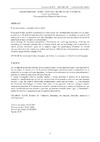Please use this identifier to cite or link to this item:
https://accedacris.ulpgc.es/jspui/handle/10553/71232
| DC Field | Value | Language |
|---|---|---|
| dc.contributor.author | De Luxán Hernández, Lía | en_US |
| dc.date.accessioned | 2020-04-03T18:00:49Z | - |
| dc.date.available | 2020-04-03T18:00:49Z | - |
| dc.date.issued | 2019 | en_US |
| dc.identifier.issn | 1989-5097 | en_US |
| dc.identifier.uri | https://accedacris.ulpgc.es/handle/10553/71232 | - |
| dc.description.abstract | Translation Studies shouldbe considered as an autonomous and interdependent discipline with an object of study per se. No field of study should be constrained: the phenomenon of translation can only be well understood when it is compared with other disciplines, and applications and procedures developed in other fields of study are taken into consideration. When studying the translation phenomenon, theoreticians are observing, describing, predicting and prescribing the translation practice; this is a human activity and not something which is produced by natural sources. Academics´ goals are to improve target text productions, determine the mental processes that occur when translating; analyze and discover which factors and competences are required for achieving good results, among others. | en_US |
| dc.description.abstract | Los estudios de traducción deberían ser considerados como una disciplina autónoma e interdependiente, con un objeto de estudio per se. El fenómeno traductológico únicamente puede comprenderse en su totalidad si se compara con otras disciplinas y se tienen en consideración los avances, procedimientos y métodos de análisis de otras ramas del conocimiento. El teórico-investigador observa, describe, predice e intenta prescribir la práctica de la traducción, teniendo en consideración que no está ante un fenómeno de la naturaleza, sino ante una tarea humana, con todo lo que ello conlleva (subjetividad, condicionantes, condiciones personales…). La investigación del fenómeno traductológico se centra, entre otros, en los siguientes objetivos: conseguir mejores traducciones; descubrir de la manera más exhaustiva posible el mecanismo interno del traductor (en qué piensa cuando opta por una solución o por otra, qué procesos mentales tienen lugar…); desentrañar y analizar los factores y competencias que se requieren para traducir. | en_US |
| dc.language | spa | en_US |
| dc.relation.ispartof | Entreculturas (Málaga) | en_US |
| dc.source | Entreculturas [1989-5097], v. 10, p. 23-34 | en_US |
| dc.subject | 570112 Traducción | en_US |
| dc.subject.other | Translation Studies | en_US |
| dc.subject.other | Discipline | en_US |
| dc.subject.other | No Labels | en_US |
| dc.subject.other | Autonomous and Interdependent Discipline | en_US |
| dc.subject.other | Estudios de Traducción | en_US |
| dc.subject.other | Disciplina | en_US |
| dc.subject.other | Sin etiquetas | en_US |
| dc.subject.other | Disciplina autónoma e interdependiente | en_US |
| dc.title | Los estudios de traducción: una disciplina sin etiquetas | en_US |
| dc.type | info:eu-repo/semantics/article | en_US |
| dc.type | Article | en_US |
| dc.investigacion | Artes y Humanidades | en_US |
| dc.type2 | Artículo | en_US |
| dc.utils.revision | Sí | en_US |
| dc.identifier.ulpgc | Sí | en_US |
| dc.contributor.buulpgc | BU-HUM | en_US |
| item.grantfulltext | open | - |
| item.fulltext | Con texto completo | - |
| crisitem.author.dept | GIR G9-Historia, economía y sociedad | - |
| crisitem.author.dept | Departamento de Filología Moderna, Traducción e Interpretación | - |
| crisitem.author.orcid | 0000-0002-0250-1496 | - |
| crisitem.author.parentorg | Departamento de Ciencias Históricas | - |
| crisitem.author.fullName | De Luxán Hernández, Lía | - |
| Appears in Collections: | Artículos | |
Page view(s)
79
checked on Jan 10, 2026
Download(s)
59
checked on Jan 10, 2026
Google ScholarTM
Check
Share
Export metadata
Items in accedaCRIS are protected by copyright, with all rights reserved, unless otherwise indicated.
